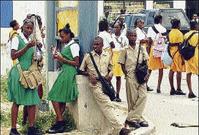Avia Collinder, Sunday Gleaner Writer

Students wait for transportation to go home after school. Some of the anti-social behaviours exhibited by students are being blamed on the shift system. - Photo by Dalton Laing
They learn to smoke with friends of whom their parents would not approve; they develop inappropriate sexual relations; they arrive at school anytime they want.
These are some of the behavioural problems being blamed on the shift system used by some 116 schools locally. Introduced years ago by the Ministry of Education in 1973 to cope with overcrowding and to open up more spaces for students, this system allows students three to four hours of 'free time' each day.
"Some are not even going to school and the parents do not know until the school calls them in," observes Dr Gillian Lowe, clinical child and adolescent psychiatrist at the University Hospital of the West Indies and the Child Guidance Services of the Ministry of Health.
"The parents say they can't stay home and have no one to monitor them. The shift system results in blocks of unsupervised time, which is a window of opportunity to meet and associate with anti-social persons and learn anti-social behaviours, which they take to the school," says Lowe. "They start to exhibit these behaviours and it becomes apparent to the disciplinary arm of the school that something is wrong, and they call in the parents. Of course, by this time, it might be too late."
According to Desrene Miller, guidance counselor at St Anne's High School in Kingston, "The reality is that they are left to raise themselves. Children are at risk, because they have so much time in the morning after parents leave home for work. All kinds of things can happen. Those who go home late at nights have problems with transport."
Parents out of the loop
A structured solution must be found to deal with what Miller considers a national problem. She argues that when both parents work at least eight hours or more each day, they do not get as much time to interact with their children. "Many of the referrals that we get are actually from the schools, which indicates that parents are out of the loop. It is not that they are bad parents, but their time limits exposure," notes Miller.
She adds: "We have to find a solution which facilitates the need for employment and at the same time allows for children to be supervised while not in school. We need adolescent crèches or something which is structured - where homework can be done and social skills taught. It is really a serious problem."
Audrey Bailey Francis, community outreach manager at the Child Development Agency, says she does not consider the shift system a fundamental part of the problem. "It is the unsupervised sessions. Parents need to put plans in place to ensure that supervision is adequate during this time in which they are not at school," she tells The Sunday Gleaner.
Cost-free alternatives
Sherena Forbes, clinical psychologist, shares this view, stating: "Regardless of when the child goes to school, it comes down to parental responsibility. You need to have somebody to supervise them and engage them in extra-curricular activity. The onus is really on parents to provide that kind supervision."
Forbes says the shift system exists because there is not enough physical space to place children. "Extra-curricular activities do not have to cost money; community-based programmes can be organised," advocates Forbes.
"Teenagers need something to keep them occupied - sports, service clubs, or even just a group of teens forming their own club. Do not leave then with the television and computer. Teens are old enough to care for themselves but are still children," she adds.
At the Papine High School, which operates a shift system, a guidance counselor noted: "Whenever children are unsupervised, its always a problem. Children are curious and will always be exploring." The school, with the help of local churches and other organisations, has partially solved the problem with the setting up of functional homework centers.
Extra lessons
Naggo Head Primary School in Portmore, St Catherine, another shift school, has a successful programme in place. Extra lessons provide a welcome buffer between home and school.
"Those on the afternoon shift come from nine in the morning to attend extra lessons, and those who are on the morning shift leave at three, for the same reason," the school's guidance counsellor said. She noted that students who were unable to pay for lessons were still included by teachers in this extra-curricular programme.
Guidance counsellor at Mona High School, Paul Messam, is concerned about those students who are at home unsupervised in the mornings. "Many of these students have no family life. They pretend they are going to the library and the devil finds places for them to go," he argues. "We need a total renewal of parenting attitudes, a restructuring of family. Schools should also create activities which would force students to use libraries or do other activities for which they are held accountable. Keep them occupied."

